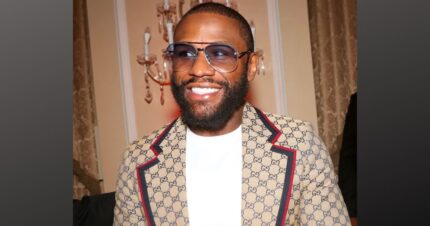By Loren Feldman
Adella Colvin was 34, recently married, and living in Georgia when she first visited a yarn shop on her own five years ago. One of her neighbors had suggested knitting as a hobby. Colvin figured she’d give it a try and headed to a shop in South Carolina, about 40 minutes from where she lived.
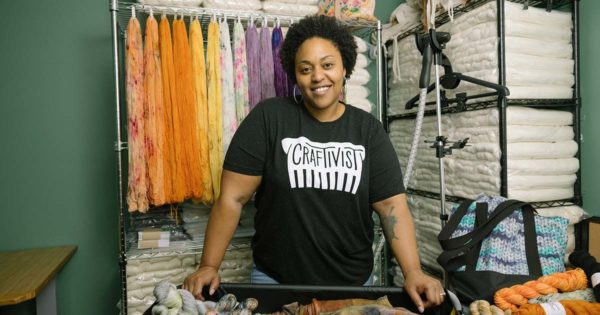
That experience could easily have become her last. Colvin barely made it past the front door when the owner, an older white woman, stepped in her way. “My bathroom is for customers only,” the proprietor declared.
“She saw a chubby Black woman with an afro knocking on her door,” Colvin says, and that was enough to end the interaction. “My heart shattered.” She turned around and left. Soon after, she decided to buy yarn online, for simple starter projects—hats and scarves. Then she decided to experiment with dyeing her own yarn.
When she wore her dyed wools, there’d always be compliments, women mostly who’d tell Colvin how much they liked the colors. So she opened an Etsy shop, Adella’s Crochet Cottage, in late 2015. “When I started selling,” she says, “I would not show my face. If people see a Black face, they think ‘inferior.’ ”
When her daughter, Lola—nicknamed Bean—was born in June 2016, Colvin started to think about the legacy she was building. She rebranded her business LolaBean Yarn Co. and hired an illustrator to create an image of Bean, with big, bright eyes and unmistakably black skin, as her logo.
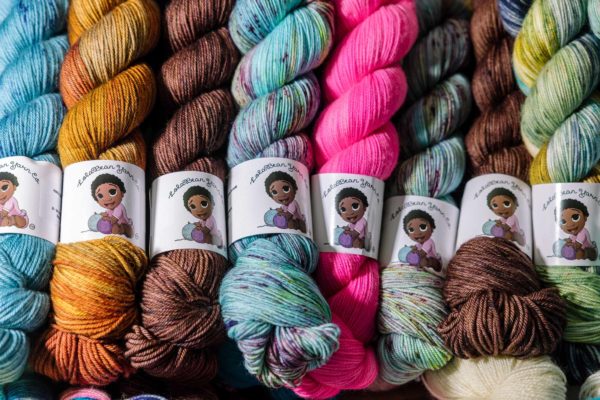
Today, Colvin is an in-demand independent dyer whose yarn is sold in shops around the country. Her customers remain mostly white, but she says her demographic has gotten younger and Blacker. Anyone who buys her yarn sees “my baby’s little Black face,” she says. “I can’t tell you how many times I have done a show, and I’ve had Black women walk up to me bawling, ‘I just want to thank you.’ ”
The world of knitting and other fiber arts—embroidery, weaving—conjures images of a grandmother in a rocking chair. But in recent years, the quiet industry of tiny neighborhood yarn shops scattered across the U.S. has become an unlikely cultural battleground. It’s been divided by charges of racism and cultural appropriation that have erupted in a series of social media firestorms, prompting some owners to close, sell, or rebrand their business.
The cultural tension has been set against the backdrop of a global pandemic and an economic crisis that threaten almost everyone in the business who hasn’t mastered e-commerce—meaning almost everyone in the business. Before the crisis, there were 1,500 to 2,000 local yarn shops in the country, producing $750 million in annual revenue. Fewer stores are almost certainly operating today, but there are no hard numbers, because the trade association that used to track them closed this spring after the pandemic forced it to cancel its annual show.
Colvin continues to knock on doors. She got a big break in 2017 when she was introduced to Gaye Glasspie, a Black sales coach from Clifton, N.J., who, with more than 40,000 Instagram followers, is a social media influencer among knitters. Glasspie raised Colvin’s profile overnight with knitters and women business owners across the country. “When she spotlighted me,” Colvin says, “I got more Black customers and followers.”
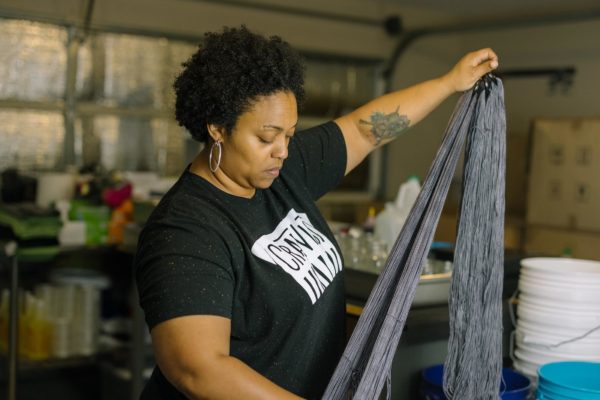
Glasspie, better known as GG, learned how to knit from YouTube. The platform includes thousands of videos from big retail brands and stores, such as Martha Stewart and Hobby Lobby, and indie stores across the globe, drawing hundreds of millions of views from consumers. GG bought her supplies from national retailers, including Jo-Ann Stores and Michaels, where a ball of acrylic yarn can cost less than $5. Then she discovered local shops that feature hand-dyed natural fibers that can cost $30 a skein. “I feel like yarn saved me,” GG says. In 2012 she unexpectedly and in quick succession lost her dad, her mom, and her job managing a call center for Verizon Wireless. Knitting suddenly became a bigger part of her life. “My yarn didn’t ask me why I was still crying,” she says.
Social media expanded Glasspie’s following and she started getting recognized in stores—one knitter telling another about the feed: a constant stream of knitting tips, social commentary, and her signature color, orange. “Her following is insane,” Colvin says. “I kid you not. Orange is the hardest color for me to sell, unless it’s something I’m working on with GG.”
Last year, Glasspie introduced Colvin to Felicia Eve, who owns String Thing Studio in Brooklyn, N.Y., one of maybe a half-dozen Black-owned yarn shops in the country. Eve became the first shop owner to promote Colvin’s yarns with a trunk show. They planned for a three-day sale, but with a boost from Glasspie’s Instagram feed, Colvin’s stock sold out in one. The three women have been FaceTiming daily—about yarn, business, life—ever since.
String Thing Studio shares a brownstone with an Indian restaurant in the family-friendly Park Slope neighborhood. A podiatrist who set aside her practice to stay home with the kids before deciding to pursue her passion, Eve says she chose the word “studio” deliberately. She wanted a place where crafters would feel comfortable plopping into a chair for an hour or two to knit. “You go into that shop no matter what color you are,” Colvin says, “it’s like going to a friend’s house and sitting on the sofa, which is why I call it my local yarn shop even though I’m in Georgia.” And yet, even in Brooklyn, customers often assume that the white woman who works for Eve is the owner. String Thing Studio has little presence online and hasn’t done much more than break even. Eve says her husband, not her business, covers the home mortgage. “Put myself on the payroll?” she says and laughs. “Dude! When? How?”
The industry’s cultural battles peaked in June 2019 when Ravelry, long knitting’s dominant social platform with a vast database of patterns, ignited a skirmish by banning all pro-Trump content. “We cannot provide a space that is inclusive of all and also allow support for open white supremacy,” the owners announced in a written statement. This year the script flipped when Ravelry was accused of failing to be inclusive by not fixing a website redesign that some users said triggered migraines, seizures, and nausea.
After George Floyd was murdered in Minneapolis, Steven Berg, who owns one of the country’s most successful stores and calls himself “the Elton John of knitting,” posted a video announcing that he had yarn kits ready to send to anyone who wanted to put aside her troubles and get back to her knitting. The cries of white privilege were immediate, no doubt inflamed by the location of Berg’s store just blocks from where Floyd was murdered. The video came down, the store closed temporarily, and Berg apologized. “I’ve changed from being the loudmouthed leader to listening and learning,” he says.
The crossfire prompted many knitters of color to share their stories of racism in the industry for the first time. “People say, ‘I had no idea there was so much racism in knitting,’ ” Colvin says. “Of course. Racism was built into the fabric of our country.”
Many white-owned businesses responded by seeking out people of color to follow and support. Glasspie, who had ended 2018 disappointed that she had failed to reach 10,000 Instagram followers, blew past that in 2019 and 2020. “All the white people were like, ‘Follow GG, follow GG. She’s a good one,’ ” she says.
Inspired by images of white protesters standing between police officers and Black protesters, Glasspie started a hashtag, #StandintheGap, that encourages people to step up and offer that kind of protection in everyday life. Colvin has leaped from one wholesale account to 30 with a waitlist of more than 70. Her production time is booked through the end of the year. Still, she says, she found the increased business that followed Floyd’s murder unsettling. “It can be really heavy trying to figure out who genuinely wants to work with you,” she says, “and who is using you just to make them seem more inclusive so they don’t lose money.”
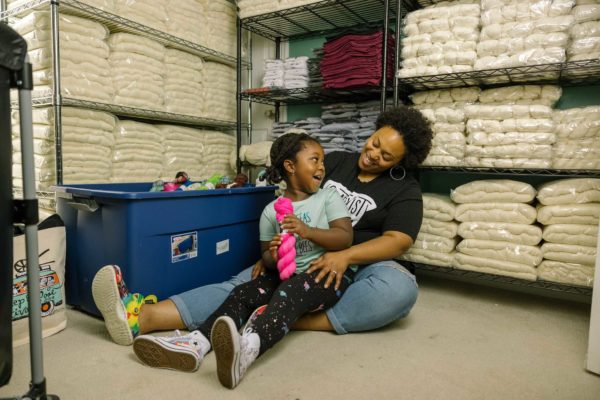
The concern has led her to become more outspoken. The woman who once tried to hide her Black face says she has lost the little bit of filter she had left. “Sometimes I’m brutal,” she says of her Instagram posts. “If that makes you want to not buy my yarn, don’t buy my yarn. If I don’t work for you, that’s fine. I’m not going to ignore who I am at my core. I’m not going to make middle-aged white women comfortable about where they buy their yarn.”
Colvin and Glasspie entered 2020 with big plans. Glasspie was hoping this might be the year she could give up her day job and just do yarn. As the year began, she had events booked every month. She made it to California in February before everything shut down.
In March, Colvin was getting ready to move her business out of her garage. She needed production space for her wholesale operation, and she wanted to create a community hub where she could teach classes—“sort of like a church, but for fiber,” she says. She found what she thought was the perfect spot, at a good price, and was planning the build-out when the lockdown began, forcing her to question the wisdom of signing a five-year lease and abandon the plan. “I probably cried for four days,” she says. Colvin and her husband recently closed on a new home in a more diverse neighborhood—“I need my kids to see Black people”—which will allow her to turn their current home into her “dye house.” She plans to hire employees and expand production.
On the last Friday in June, with the pandemic and the protests still raging, Eve told Glasspie and Colvin over FaceTime that her landlord had slapped a rent-due notice on the door to String Thing Studio. With the store closed, she hadn’t been able to pay the rent. She needed $17,000 to catch up and to retrofit the shop for Covid. When Glasspie and Colvin suggested raising money with a GoFundMe campaign, Eve demurred. “I’ll figure it out,” she said.
“Look,” Colvin said. “I get it. It’s embarrassing. All you have to do is say, ‘OK.’ ” After a few minutes, Eve agreed and Colvin activated the page. The first donation came in almost instantly. All three watched in disbelief and tears as the donations poured in: $2, $5, $500, $1,000. “Some of the biggest donations were from other yarn shops,” Colvin says. “That was what really got me emotional.” The total quickly passed the $17,000 goal. When they hit $28,000 in less than three hours, they shut down the campaign.
The next day, Eve posted an emotional thank-you video, stunning many of her followers who hadn’t even heard about the campaign. Wanting to pitch in, some sent money via PayPal. Others bought from her limited offerings online.
While the women struggled to reconcile how such an outpouring was possible from a yarn community ravaged by strife and crisis, it left Eve feeling challenged to build a better shop. “It’s yarn,” she says. “There’s nothing threatening about this. This is fun. We shouldn’t be trying to stick knitting needles in each other’s eyes.” Read next: How an Online Yarn Seller Kept Dozens of Businesses Alive
More stories like this are available on bloomberg.com




